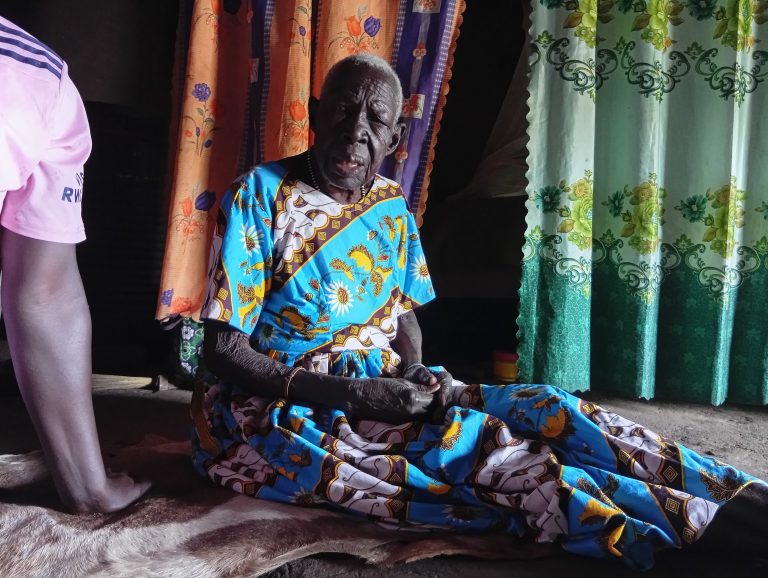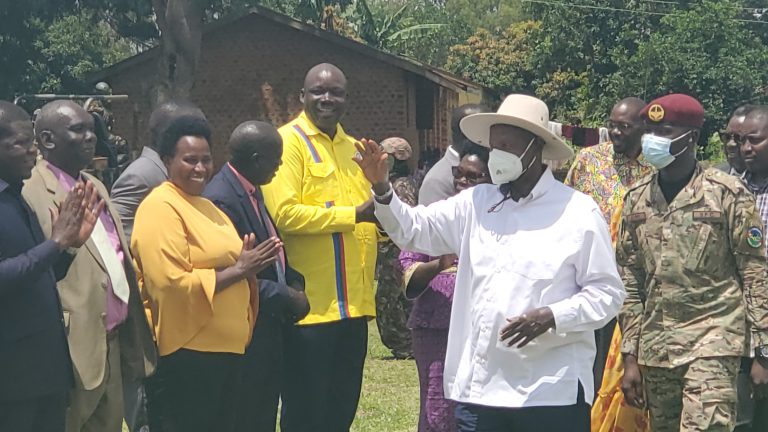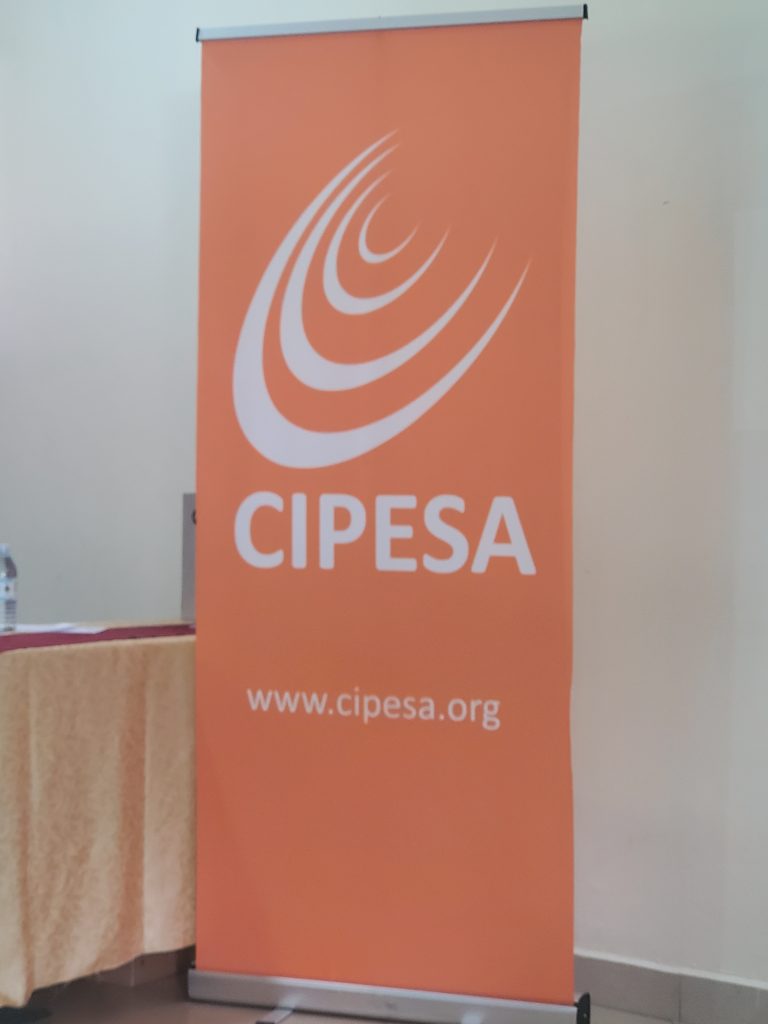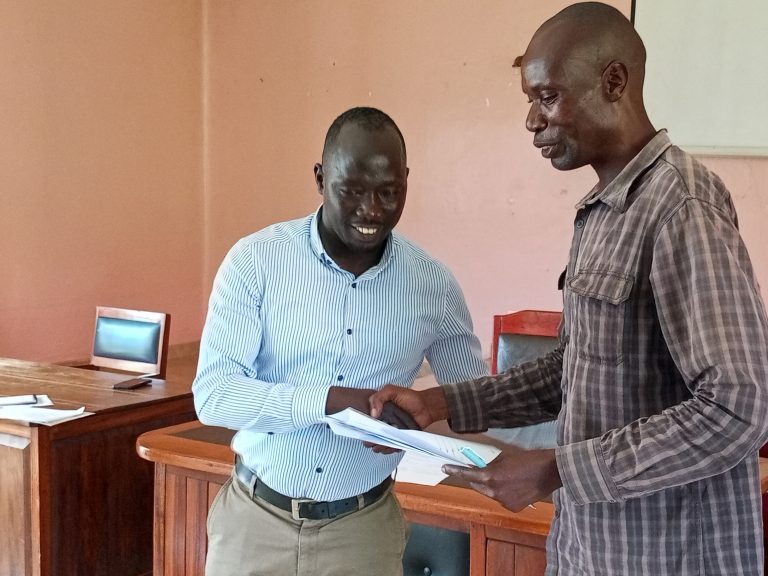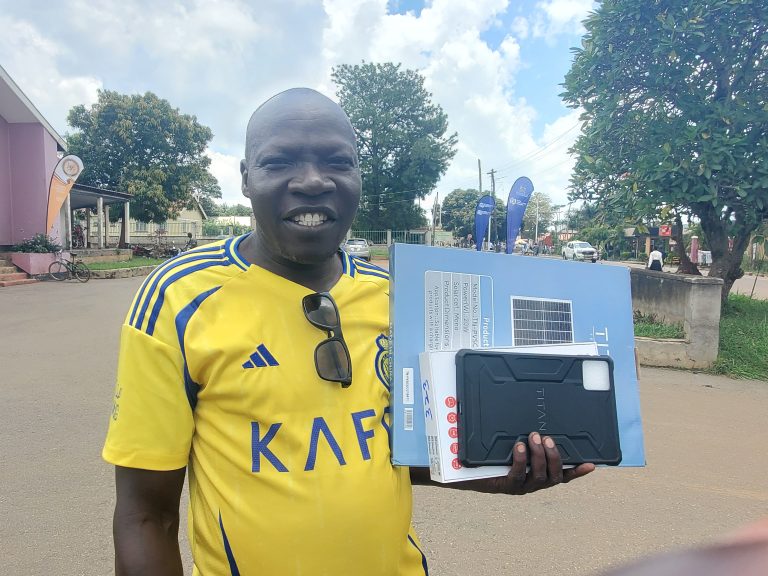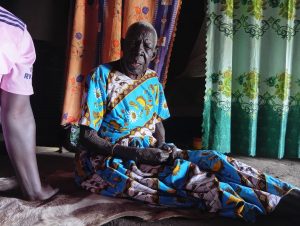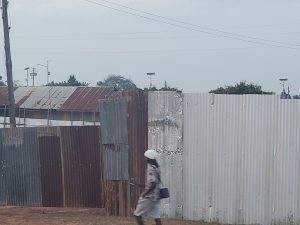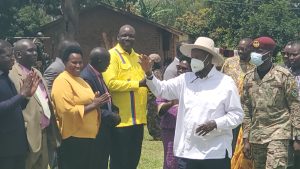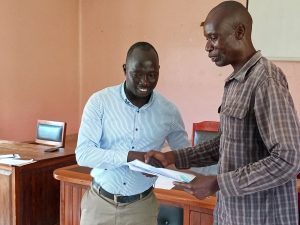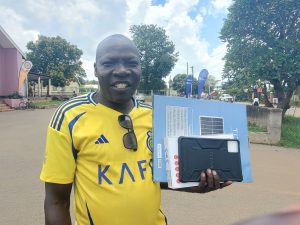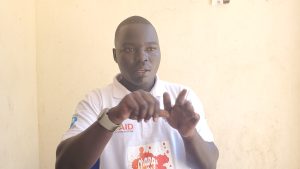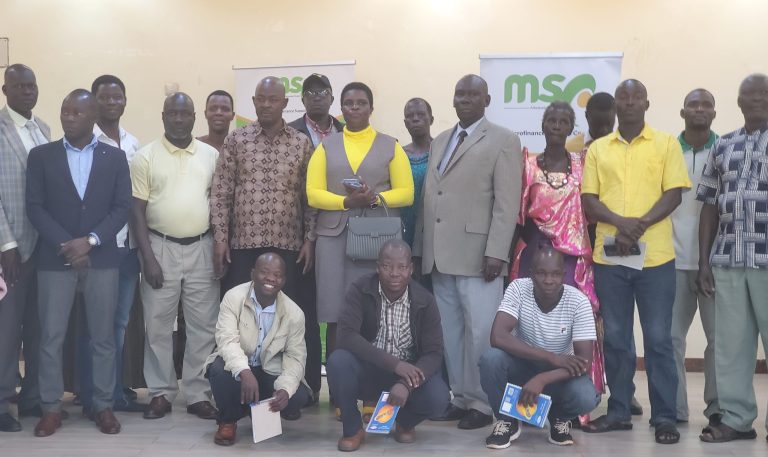The family states that the disputed land originally comprised seven plots, purchased by their late father from a businessman known only as Sultan in 1962.
By Chowoo Willy
Gulu City-Orach Gorrety Amono sits in a cramped structure of rusted iron sheets at the edge of Gulu Modern Market, watching traders do business on land she insists belongs to her family. The market grew where their home once stood. She says city officials processed a title over the same land without the family consent or compensation.
Every morning, Orach sweeps the dusty ground in front of her tiny makeshift shelter, careful not to raise her eyes too quickly. Beyond that fragile wall of timber and iron sheets stands the land her family once called home. Now it swells with the noise of a bustling market built on ground she insists was stolen.
For more than two decades, Orach Gorrety Amono has watched traders flood a piece of land in Kasubi Central cell, Bardege-Layibi Division; land she says belongs to her late father, Orach Amos Bulamoi. What began as a friendly understanding between her family and the former Bardege Division has turned into a bitter struggle for ownership, after Gulu City Council obtained a title on the land without their consent.
For years she has been moving between temporary shelters in Gulu and a small plot in Bungatira that her late father bought. Her case reveals glaring questions about how public land is acquired, documented, and titled in the city, and why those who challenge the process rarely find justice.
According to Gorretty, the family allowed the then Bardege Division to use part of their land more than 25 years ago to set up a temporary market site. The arrangement was informal, no lease, no formal rent, just verbal assurances from division leaders that the space would help decongest Gulu Main Market and generate revenue for the division.
“They told us it was temporary,” Gorretty recalls. “They said they would pay us something small for using the land, but we never received any payment. We trusted the local authorities because they were our people.”
According to Amono, the estate administrator of the family property, the then Bardege Division, under the leadership of former chairman Tony Okoya Kene, reached an agreement with her late mother, Orach Joyce, to set up two lock-up shops for the family in addition to collecting part of the revenues from the market vendors.
“I was there when it happened,” Gorretty recalls. “They sat under the mango tree here with our family in 1998 and compensated us only with Shs. 500,000 for the trees that were cut down to open up the market site.”
The family says the contested land was originally seven plots, bought by their late father from a businessman known only as Sultan in 1962. They have lived on the land ever since. Today, they accuse Gulu City authorities of grabbing their late father’s land by fraudulently acquiring land titles over their property.
The market now stands on three family plots, and the site is home to the Gulu Modern Market, one of the markets in Gulu City. But in 2024, the family discovered that Gulu City Council had quietly processed and obtained a land title over the same land, without their consent.
“We were shocked to learn that the city had titled our father’s land,” Gorrety says. “No one from the City Council ever consulted us, yet they now claim ownership.”
Voice-1: Amono explaining how her later father got the land (in Luo)
“I am called Orach Gorrety Amono. I’m the daughter to the late Amos Orach of Kaubi, whose land was grabbed by Bardege-Layibi. Bardege Division asked my mother to give them part of her land to put a temporal market, and when the market was fully established, my mother would collect half of the revenue from the market and they would also collect half. But from that time to date, now it is 25 years, and they have not given us even a single coin for the land.
Another thing which makes us sad is that we gave the land with happiness and in the end they do not pay us anything. This has made us not to study. We cannot educate our children because this land was everything to the family.
We want Bardege Division to compensate for the time they have used the land and eventually return our land, because my father used his own money to purchase the land and he got title in his name; it was not leased by government. We have all the documentation, and we request any well-wishers to help us recover our land.”
Ojara Hellen, a former councillor at Bardege Division (2011–2021), who served during the second term of Chairman Okoya, acknowledged that there was no formal agreement between the council and the landowner. She confirmed that the council never purchased the land from the family.
“What I know is that the council promised to construct two lock-up shops for the family,” she said. “However, the shops were never completed, and the family never used them,” Hellen recalls.
Hellen further stated that the landowner had made several visits to the division headquarters at their times in the council. “I saw her at the division offices multiple times, but to the best of my knowledge, she was never paid any money.”
The family members have also accused the City Council of bypassing the legally required procedures for land acquisition. Specifically, they claim the council failed to issue the mandatory 14-day public notice before conducting inspections by the Area Land Committee, as stipulated under Uganda’s land management regulations. In this case, the responsible authority was the Bardege-Layibi City Division.
The market is surrounded by roads, and only one neighbour on the eastern side of the land signed the ownership document. Meanwhile, the Area Land Committee has distanced itself from endorsing the land documents that were used to process the land title.
Okwera Santo Comboni, former Chairperson of the Land Committee for Bardege Division at the time of the inspection, stated that his committee was not involved in the inspection process during the land acquisition, which reportedly took place during the COVID-19 outbreak between 2020 and 2021.
“We didn’t inspect the land; they didn’t involve us. We just heard about it,” Okwera recalled.
The current law requires the district land board or city land board to base its recommendation on the report by the area land committee. Under the Land Act 1998 (Cap. 227), section 64(13) states: “The Board shall, upon receipt of the report and recommendations of the Committee referred to … consider the application in the light of that report and those recommendations …”, which means the board cannot approve any applications for title without the report of the area land committee.
The Area Land Committees (ALCs), which play a vital role in verifying land ownership and advising the District Land Board, are established under the Land Act, Cap 227 (1998). Section 64 of the Act mandates ALCs to inspect land, verify boundaries, and ensure transparency in land transactions. Their work is further guided by the Land Regulations (2004), which detail procedures for public notification, inspection, and reporting. These laws are designed to prevent land fraud and ensure community involvement in land governance.
Gorrety suspects that the documents used to register the land were forged. “How do you get a title on another title? We already had a land title,” she said.
Voice -2: Amono believes the land documents were forged (luo)
“For me, I think that any documents the city got was not done in a proper way. They should have allowed the landowner to give them a consent letter, but there was no clear agreement. We want court to help us recover our land. It has been long and nobody wanted to listen to us. We went to the offices of the Town Clerk, the Mayor, Bardege Division, and Bardege-Layibi Division. They do not want to tell us anything concerning our land, yet they titled it in an improper way. We already had a title on that land. They never informed us as the landowners, and we do not know how they got their title.”
The Mayor of Bardege-Layibi City Division, Oola Patrick Lumumba, confirmed that the division has no official documentation showing that it purchased the contested land on which the Gulu Modern Market stands, deepening the ownership controversy surrounding the multi-billion-shilling facility.
“There is no record indicating that payment was made, the size of the land, or any related details. Wherever you go, there isn’t a single document,” Lumumba stated.
He revealed that the problem stems from poor record-keeping and the mishandling of official documents by previous political leaders who started the market.
“When Tony Kennedy lost the election in 2006, he went home with all the documents. When he returned later, he was very sick, and the documents were scattered and disorganised,” Lumumba narrated.
Lumumba further clarified that he is aware that Gulu Modern Market was established on two portions of land. The first portion, he said, was government land originally set aside in 1969 during the regime of Idi Amin Dada, the former president of Uganda, to serve as a market for the army barracks.
According to him, the second portion was negotiated with the family of Bulamoi, and as part of the agreement, the division was expected to construct two lock-up shops for the family as compensation.
“So, the family was already settled with the agreement. And there was nothing to stop the then Gulu Council from processing the title. Actually, that title was processed by the Gulu Municipal Council, not even the city council.”
Voice-3: Lumumba shares more about the market land

However, what remains most concerning is that the city division does not have any written documentation to substantiate the mayor’s assertions. According to a former technical staff who spoke on anomality said the family presented to them a genuine title when they approached them to set up temporal market at their land.
Komakech Patrick Oketayot, the City Secretary for Production and Community, who also serves as Area Councilor Five, acknowledges that there is a challenge in maintaining proper records of land ownership. He emphasises that despite the ongoing dispute, it is imperative to find an amicable solution to the matter, as he could not either confirm or deny whether Gulu city acquired the land legitimately or not.
“Gulu City should take the lead in addressing these issues. If there are any irregularities, the two parties need to sit down and resolve them, because we want the market to continue operating,” he noted.
Gulu City Council acquired the ostensible land title as a requirement by the United Nations Capital Development Fund (UNCDF) to support the redevelopment of the market, which gave Gulu City Council 1.4 billion shillings to redevelop the Gulu Modern Market, which was originally occupied by 165 lock-up shops.
The multibillion-shilling project is funded under the Financing Durable Solutions Initiative for forcibly displaced persons of the United Nations Capital Development Fund (UNCDF) through the Ministry of Local Government.
Despite the controversy, the City Council is going ahead with upgrading the market on the contested land.
Family Seeks Legal Redress
The family says they have held endless meetings with Bardege Division authorities since 1997, demanding payment for the use of their land. However, the division reportedly kept making empty promises without ever paying the agreed rental fees. The family and the division had verbally agreed to share revenue from the market dues for 3-5 years before they could buy the land.
In 2000, the family dragged the division to court to reclaim ownership of their land, but the case stalled after the death of their then estate administrator, leaving the matter unresolved for years.
The Division Mayor, Oola Patrick Lumumba who has now served for 10 years as the division mayor has distanced himself having any meeting with the family members.
“The family has never presented itself in any organised manner. The person who was supposed to represent them reportedly had a mental health condition. Up to now, I have not interfaced with that family,” he explained.
Feeling cheated and unheard, Gorretty has now again sought legal redress at Gulu high Court, arguing that the city violated her family’s land rights. Her lawyers are challenging the title in court and demanding compensation for years of occupation without payment and reclaiming their father’s land.
“We had meetings several times with RCC (Resident City Commissioner), they want to compensate the family only sh500 million for using the land. Family rejected the advances from the city, because that money is not equivalent to the value of the land used over the last 25 years”, Gorrety adds.
When contacted for comment, officials from Gulu City Council maintained that the land was acquired legally as part of an urban modernization plan. They declined to share copies of the title or correspondence with the family, citing ongoing court proceedings.
“Let them go to court and seek for the cancellation of the title, but as government, we already have the tile, if they know the land is theirs, let them go and put a case in court”, Gulu City clerk Ahimbisibwe Innocent argued.
Ahimbisibwe notes that there always claims but there are always due true positions which shall illustrate who is telling lies.
Call for Justice
For Gorrety Orach Amono, the fight is more than a legal battle; it’s about protecting her father’s legacy.
“Our father acquired this land before Gulu even became a city,” she says. “We want justice, not charity. The city should respect the people whose land built its markets.”
The legal expert says the matter can be quickly resolved if the council opts for an out-of-court settlement and engages the family of the late Bulamoi.
Tony Kitara warns that the city authorities should stop joking and sitting on a time bomb. “They should sit with the family and either enter into a public-private partnership or find an amicable solution. People have done it successfully in other areas.”
Gorrety now lives on a nearby plot, taking care of six children and seven siblings, while her family’s ancestral land remains at the center of one of Gulu’s most contested urban developments.
Amono says the loss of their land denied her family the future they were promised. “We are not happy. We didn’t study, our children are not studying as well, because the land that used to feed us was taken and we have never been compensated,” she says.
Displaced by the dispute, she now moves between temporary shelters in Gulu City and a small plot in Bungatira sub county that her late father bought, where she plants food crops to keep her family going.
Amono hopes that the ongoing case before the Gulu High Court will finally restore their land and the dignity she believes was taken along with it.
Vendors Demand Compensation
When the operations of Gulu Modern Market failed to take off, the Division authorities in 2018 and 2020 placed advertisements inviting traders interested in acquiring lock-up shops at the market to submit their bids. According to the Division Mayor, Oola Patrick Lumumba, this followed the emergence of several small and illegal markets in different areas, rendering the modern market redundant.
“There were very few traders, and eventually people began converting the lock-up shops into rental houses,” Lumumba explained. “The main challenge was that another market developed on its own, and Bardege Division failed to close those illegal markets,” he added.
These are the traders who have since been evicted, with their lock-up shops demolished. The controversy has also disrupted the livelihoods of hundreds of market vendors operating within Gulu Modern Market.
At least 165 members of the Gulu Modern Market Lock-Up Shops Association have also dragged Gulu City Council to court, claiming that the recent expansion and redevelopment of the market forced them out of their shops without listening to them or compensation.
“We invested our life savings in those lock-up shops,” says Ongaba George, the current Chairperson of the Lock-Up Shops Association. “Now we are being evicted in the name of modernisation. The city has not been fair to us.”
They described it as an unlawful eviction and the demolition of lock-up shops they constructed with their own funds. According to Ongaba, they followed all the necessary legal procedures to establish the shops after being invited by the division in 2018 and 2020.
“They refused to listen to us and even threatened our members, yet we never defaulted on rent payments. Later, they went ahead and demolished part of the buildings we had constructed with impunity. We are now demanding compensation, and the court will determine the amount,” he added.
What traders find most disturbing is that no formal contracts were ever signed between the shop owners and either the division or the city authorities. Despite this, they have consistently paid annual rental fees of Shs 150,000 to the division since they started doing business there many years ago.
The traders now wonder how the city could collect money from them for years, only to turn around and disown their rights when redevelopment began. “They disrespected the court order and went ahead to demolish our shops,” Ongaba notes.
The vendors accuse the city of ignoring multiple petitions and claim that their properties, including lock-up shops and kiosks, were demolished without a resolution of the matter.
“We were never given alternative space or compensation,” Ongaba says. “We support development, but it must be inclusive. We are not squatters; we were registered business owners.”
The City Clerk, Ahisimbibwe, says the court is there to handle complaints, noting that “it is natural,” and stated that everyone has the right to seek redress through the courts.
Gulu Modern Market is one of the three markets established in 1997 to boost local revenue for the division, which at the time was struggling financially and unable to facilitate council meetings. The other two markets, Kabedo-Opong and Lacor Complex Market, have performed well since their inception.
As the court battle looms, the case of the Gulu modern Market raises deeper questions about how Uganda’s cities acquire land, who benefits from urban growth, and what happens to families whose ancestral rights are quietly erased in the name of modernization.
For now, the land that once symbolized opportunity for a growing market has become a symbol of conflict, between the past that built Gulu and the future that threatens to forget it


